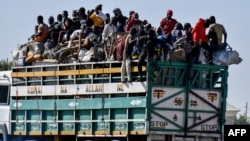Nigerian authorities and the U.N. Office for the Coordination of Humanitarian Affairs have launched an appeal for $910 million to address an escalating humanitarian crisis in the northeastern states of Borno, Adamawa and Yobe.
The 2025 Humanitarian Needs and Response Plan was unveiled Thursday at the U.N. House in Abuja.
The appeal aims to raise nearly a billion dollars to provide lifesaving assistance to some 3.6 million people affected by the more than 15 years of insurgency and insecurity in northeast Nigeria.
Officials said humanitarian needs have worsened recently due to climate shocks, including devastating floods, and deepening economic issues.
Mohammed Malick Fall, the U.N. resident coordinator in Nigeria, highlighted the growing challenges.
“This occasion underscores our collective resolve as a community to millions of people here in Nigeria. We have seen a spike in the number of people facing food insecurity. We have also seen a rise in children suffering from malnutrition,” he said. “In 2024, we experienced perhaps one of the worst floods.
“Humanitarian interventions are key in saving lives, but they can't be the solution for all the problems across Nigeria. What is required also is for development to step in, that we double down on peace building," Fall added.
The 2025 plan prioritizes food security, health care, water and sanitation, with a particular focus on vulnerable groups such as women, children and people with disabilities.
The plan also seeks to tackle the root causes of poverty and underdevelopment while building the resilience of vulnerable communities.
Fall noted that just 57% of last year’s funding target was achieved — a number that was still slightly higher than the global average.
Nigeria’s Minister of Humanitarian Affairs, Nentawe Yilwatda, underscored the importance of taking a proactive approach to the emergency.
“The 2025 Humanitarian Response Plan prioritizes saving lives, building resilience, and adopting adaptive strategies to address evolving challenges with limited resources. This plan shifts from a reactive to a proactive approach, aiming to mitigate disasters before they occur,” Yilwatda said. “While the focus remains on Borno, Adamawa and Yobe states, it also acknowledges growing humanitarian needs in the northwest and north-central regions.”
Borno, Adamawa and Yobe states have been grappling with terrorism from Boko Haram and widespread insecurity from armed gangs for over 15 years, creating one of Africa's most severe humanitarian crises.
Zubaida Umar, director-general of Nigeria's National Emergency Management Agency, emphasized the need for collaboration.
“The success of this plan lies in collaboration, synergy, and a people-centered approach. The numbers in this report represent real lives — children, women and men, families whose resilience inspires us to act with urgency and compassion,” Umar said.
The U.N. estimates that 33 million Nigerians will face food insecurity in 2025, up from 26.5 million last year. Among them, 2.5 million children are at risk of dying from severe acute malnutrition without immediate intervention.




